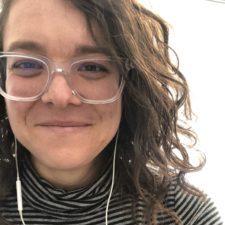
Aging as an Instructor
I finally went to my primary care doctor the other day and proceeded to unload about three years’ worth of pent-up ailments upon her. I'm losing my hearing! Do I have early-onset dementia? My right knee hurts! Can you test my thyroid? I think I have diabetes! What is this weird bump? My pinky is numb! Is my heart rate normal? Am I a hypochondriac?! This poor woman.
I’m pretty sure she diagnosed me with a very serious condition called… “aging.”
I’m turning forty this year and suddenly, it seems, I find myself routinely waking up at four a.m., taking a handful of vitamins with breakfast, and grumbling about “kids these days.” The skin on the back of my hands has turned to crepe paper. The other weekend I didn’t go watch a friend’s band play because the show started WAY too late. Readers, it started at nine p.m. I fear it can no longer be denied: I’m getting older.
It’s not that I don’t spend time thinking about bodies, including my own. I’ve read books such as Minding Bodies: How Physical Space, Sensation, and Movement Affect Learning (Hrach, 2021). I teach courses on disability and race—two classes in which the body comes up a lot. I emphasize to students that religion isn’t just about beliefs; it’s enacted and embodied amidst a material world too. I know I need a snack in the middle of my Mon/Wed 9:35-10:50 a.m. class or my stomach will let out a series of plaintive whale songs. I’ve dealt with decades-long injuries. I’ve suffered from long COVID. People I love have died. But, oddly, I haven’t thought all that much about aging, or its relationship to my work, until more recently.
Part of this odd oversight may be that aging is pretty embarrassing sometimes. Kids can literally fall out of a tree, get up, and walk away just fine; I can pull my back, and need to take it easy for a week, because I reached too far trying to plug in a lamp. This isn’t exactly the kind of story I want to broadcast at the monthly department meeting. Part of it may be that it’s hard to admit, perhaps even to fathom, just how much our lives are affected by this “meat suit” (as my yoga teacher calls it) that is only ours temporarily. Part of it may be that professors tend to work late into life—and so aging doesn’t seem all that relevant to my professional world. Part of it may also be that, because faculty are constantly encountering a turnstile of younger people in our classes, it may be easy to forget we ourselves aren’t forever young. I still feel only a few years older than my students (especially whenever I can sense the presence of free pizza nearby). Part of it too may be that we fancy ourselves living “the life of the mind”—even if it’s a big lie or hell, for a lot of us—and the mind can seem ageless (though the other day I stood in front of my bathroom sink and couldn’t remember which handle was for hot, so….). Part of it is denial, I’m sure.
Aging brings up a bunch of considerations—and not just about the indignities and rebellions of a body I can no longer (could not ever?) control. How do I continue to do this work well when my mind is no longer as sharp as it once was? (And what does “well” even mean? Perhaps such notions change over time….) What do I have to offer to my colleagues and students, now that I am no longer fresh out of school? How do I make my own meaning, when the milestones and achievements of the earlier years (e.g., get a degree, get a job) have passed? How can I stay relevant in a rapidly changing world, around those same youths I mentioned above? How can I remember where I put my glasses?!? What are my new goals, what am I aiming toward, where is the forward momentum coming from now? How do I tap into the wisdom of mentors and others who have been through this time and these transitions before me? How do I learn to live with the losses, both personal and professional, that accumulate? How do I stay excited about doing the same thing, for semesters on end? Are there really ways to beat or stave off mid-career malaise or the midlife blues? How do I do *gestures around* all of this for another several decades? These are tough questions to contemplate and I don’t have the answers yet. I’m not sure I ever will.
Some of you are probably chuckling to yourselves. What I wouldn’t give to be 40 again, you might be thinking. Yet difficult wonderings can come for us at any age or stage in our career. I’m remembering a quotation my mom, who has since passed away, sent to me once: “Sometimes when you’re in a dark place, you think you have been buried. But you’ve actually been planted.” Now, maybe, is a time to grow.
Leave a Reply